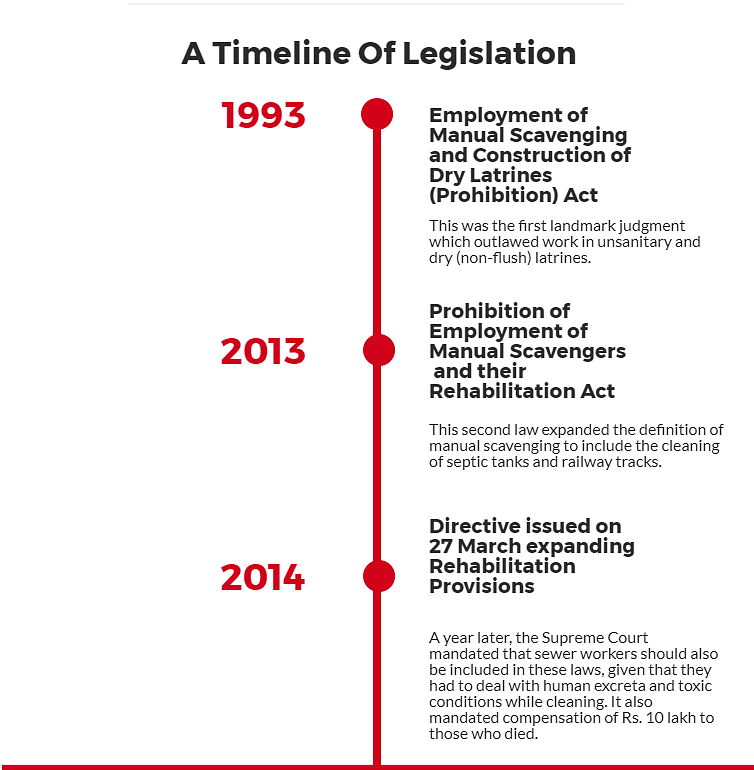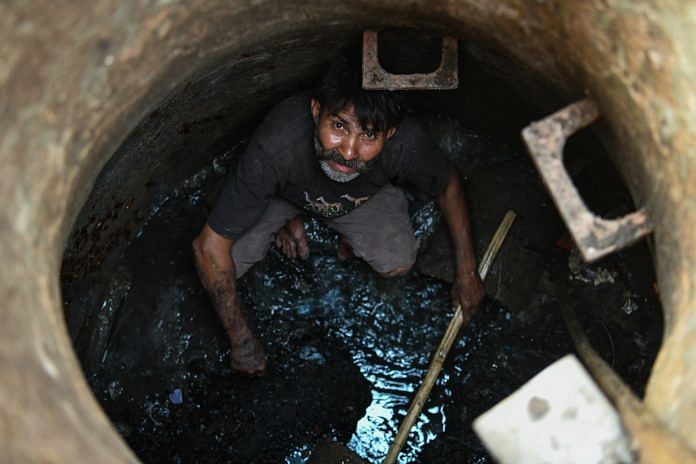Eleven sewage workers died in seven days despite manual scavenging being abolished years ago.
Eleven sewage workers have died in the last seven days but Indians continue to be unperturbed about it. The National Crime Records Bureau (NCRB) does not even collect information about sewage worker deaths – as if their deaths are not important enough.
Coupled with this is the absolute lack of any political will in the country to do something about the sewage deaths. Many of us from the Safai Karamchari Andolan went to the President and Prime Minister Narendra Modi as the number of deaths rose, and gave them data to show the massive scale of the problem. We were told they would “look into the matter”.
Sewage worker deaths are not a matter you can look into some other time. The Supreme Court in its 2014 judgment abolishing manual scavenging in all states clearly said that everyone has the right to live life with dignity. Right now, all the government promises is Rs 10 lakh in compensation to the family of the deceased.
Also read: Twitter users raise Rs 24 lakh for family of deceased Delhi sewage worker
In New Delhi itself, there have been 97 reported deaths in the last four-five years. Of them, not even 10 per cent have received the compensation money. And these are just the reported deaths, of course, there are many more.
Sewage workers don’t need compensation after their death as much as they need the Centre to mechanise and modernise the process of cleaning sewers to prevent deaths in the first place.
If the Centre can fund the mechanisation process, the states can implement it. Even if you take up this process on a war footing, it should take about six months. But we have been telling the Centre about this since 2010 and nothing has come of it.
When it comes to other health concerns like polio or malaria, the Centre takes initiatives and the states and local bodies implement them. So, why is there a hesitation about acting on sewage worker deaths? It is because of our casteist mindset that we have conveniently ignored the problem.
Prime Minister Narendra Modi’s Swachh Bharat campaign says the solution to all sanitation problems in India is building toilets. All the states were told to construct toilets, and now 447 districts have been declared open-defecation free. But where is the will to act on the plights of sewage workers with as much speed?

We only care about these deaths depending on the media coverage and the geographic location. For example, deaths in national capital Delhi may get talked about a bit. Several such deaths in various parts of the country don’t even make it to our newsflash.
Another crucial problem in the country is that top officials, ministers, political parties think these deaths are the problem of local bodies. But no local body has the capacity or the finances to implement solutions.
Also read: The ‘c’ in Swachh Bharat is caste and Modi needs to address it
The duty of coming up with technologies to end the practice lies with the Centre. If the Centre can fund the mechanisation process, only then can the states take it up with the local bodies. But the government is now busy passing the buck. How can politicians do this in a democracy? This is a horrible example to set.
There must be an immediate incorporation of technology and modernisation of sanitation methods. We also have to identify all sewage workers and allow them a dignified way out of it. The government has to provide special packages to the workers. None of these steps have been taken, which is why you hear of deaths every day. This is a national disaster.
The 2013 Act very clearly says that the government is responsible for sewage worker deaths. It also states that no one should enter the sewerage pipelines unless there is an emergency, and then too with safety gear and training. We are now acting like every day is an emergency.
Also read: Swachh Bharat has made little difference, govt should factor in criticism
So what if there is a law on abolishing the practice –where are the government law enforcement agencies who can act on it? India works with a top-to-bottom approach. Unless the mindset at the top changes, the attitudinal shift won’t happen on the ground.
We are launching a week-long public campaign, #StopKillingUs, to protest the rising number of deaths and the government inaction.
The author is national convener of Safai Karmachari Andolan, and a Ramon Magsaysay award winner.




Technology for cleaning mechanically is there and sanitation workers should be provided all protective gears if any manual cleaning is done.